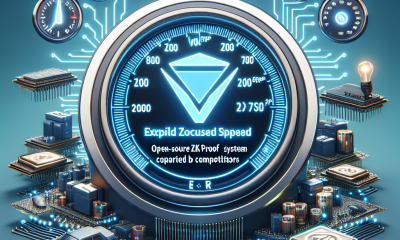Ethereum
Ethereum’s Vitalik Buterin and Crypto Influencer Ansem Engage in a Heated Exchange Over Ethereum and Celebrity Token Endorsements

The crypto community witnessed a clash of titans as Ansem, a notable crypto influencer, stirred a digital storm, catching the eye of ethereum‘s co-creator, Vitalik Buterin. The exchange between the two ignited a broader dialogue regarding the Ethereum blockchain’s performance relative to its competitors, specifically solana, marking a significant moment in the ongoing debate over blockchain efficiency and utility.
Ansem, known for his influential presence in the crypto world, recently found himself at the center of controversy following a series of posts on X (previously known as Twitter). The posts drew attention due to the downturn of the Davido token, which saw a dramatic fall of over 90.5% shortly after its launch, a debacle that was further aggravated by Caitlyn Jenner’s withdrawal of support and criticism from Buterin himself.
The backlash was swift, with many users pointing fingers at Ansem for promoting the token, thereby highlighting the risky nature of celebrity endorsements in the volatile crypto market. In response to the criticism, Ansem expressed regret over the Davido token fiasco, acknowledging his role in the event while emphasizing his commitment to rectifying the issue. He suggested that conversations were underway with teams about token-locking mechanisms and fostering long-term engagement within the crypto ecosystem beyond mere celebrity endorsements.
The crypto community’s response was mixed, with some users demanding more accountable actions over mere apologies. A user identified as TheFlowHorse exemplified this sentiment, arguing that it would be preferable for Ansem to outright admit his mistakes, bypassing what was perceived as evasive maneuvers.
The debate took an interesting turn when Vitalik Buterin, Ethereum’s co-founder, engaged with Ansem’s posts. Buterin’s involvement underscored the heated discussions in crypto circles, particularly focusing on the rivalry between Ethereum and other blockchains like Solana. Ethereum advocates, buoyed by the approval of a spot Ethereum ETF in the United States, defended the platform as the superior smart contract network, asserting its dominance and long-term viability against competing systems.
As the dust settles on this debate, the core issues at play transcend the individual spats between high-profile crypto figures. It showcases the complexities of the crypto market, where the confluence of technology, celebrity influence, and investor sentiment can create unpredictable outcomes. For Ethereum and its proponents, the incident has spurred introspection and dialogue about its place in the rapidly evolving blockchain ecosystem, reinforcing the vitality of innovation, transparency, and community engagement in maintaining and enhancing the platform’s standing in the competitive digital assets space.
The incident with Ansem and the wider exchange within the crypto community exemplifies the ongoing struggles within the crypto market to balance hype with substance, celebrity endorsements with genuine utility, and short-term gains with long-term viability. As the blockchain and cryptocurrency sector continues to mature, incidents like these offer crucial lessons on the importance of due diligence, the potential pitfalls of market speculation, and the enduring value of foundational technologies like Ethereum that continue to shape the future of digital finance.
Bitcoin
SEC Nears Approval of Groundbreaking Ethereum Spot ETFs, Spearheaded by BlackRock and Grayscale, for July Launch

In an unprecedented move poised to reshape the landscape of cryptocurrency investment, the U.S. Securities and Exchange Commission (SEC) is on the verge of green-lighting a series of Exchange-Traded Funds (ETFs) designed to track the spot price of ethereum (eth), the world’s second-largest cryptocurrency by market capitalization. This development is anticipated to culminate by July 4, following intensive negotiations with heavyweight asset managers including BlackRock and Grayscale Investments.
The impending approval of Ethereum ETFs represents a monumental stride towards the maturation of cryptocurrency markets and a significant vote of confidence in the digital asset class from mainstream investment sectors. The collaborative efforts of industry giants underscore a shared conviction in Ethereum’s burgeoning potential and its pivotal role in the evolving financial landscape.
Building upon the momentum generated by the successful launch of bitcoin spot ETFs in January, which amassed inflows of approximately $13 billion, asset managers are strategically positioning themselves to capitalize on the burgeoning interest in digital assets. Particularly, Grayscale is spearheading a campaign to convert its existing trust into an ETF, underscoring a broader ambition to diversify investment portfolios within the crypto space.
Reports from industry insiders, including senior ETF analyst Eric Balchunas, hint at the possibility of Ethereum-based funds making their market debut as early as July 2. This aligns with Reuters’ forecast for an official SEC endorsement by July 4. The assurance emanates from ongoing negotiations indicating that any outstanding concerns revolve around minor adjustments to the offering documents, putting the final stamp of approval within reach.
Despite the palpable excitement surrounding these developments, opinions regarding the market’s reception to Ethereum ETFs vary among analysts. While earlier introductions of Bitcoin-based financial products witnessed a staggering surge in market assets to nearly $53.46 billion, skeptics like James Butterfill, head of research at Coinshares, caution against assuming a parallel trajectory for Ethereum. He cites the disparity in market size and volume between Bitcoin and Ethereum as significant factors that could temper expectations. Similarly, Bryan Armour expresses reservations about Ethereum ETFs igniting equivalent levels of investor enthusiasm.
Conversely, a more optimistic outlook is shared by other experts, including Matt Hougan, chief investment officer at Bitwise, who projects that Ethereum Exchange-Traded Products (ETPs) could attract $15.5 billion in net flows within the first eighteen months of their launch. His predictions are buoyed by an analysis of market capitalizations and a review of international ETF markets.
The forthcoming ETFs, once approved, could commence trading within 24 hours owing to prior rule amendments sanctioned for major exchanges such as the New York Stock Exchange, Nasdaq, and Cboe. This swift transition from approval to market entry underscores the SEC’s commitment to extending investment opportunities while fostering the growth of the digital asset sector.
This pivotal development not only heralds a new era for Ethereum but also fortifies the bridge between traditional financial markets and the emergent realm of digital currencies. The introduction of Ethereum ETFs stands as a testament to the cryptocurrency’s enduring appeal and its potential to offer diversified investment portfolios. As the digital currency ecosystem continues to evolve, the spotlight on Ethereum and its underlying technology highlights the growing consensus around its value proposition and utility in the broader financial landscape. Beyond speculative interest, Ethereum’s foundational role in the expansion of decentralized finance (DeFi) platforms and non-fungible tokens (NFTs) underscores its significance beyond mere investment assets, paving the way for a new paradigm in the digital economy.
Bitcoin
Ethereum Price Soars to $3,500 as SEC Concludes Probe, Marking a Victory for the Crypto Giant

In an unexpected turn of events, the cryptocurrency ecosystem witnessed a momentous increase in ethereum‘s value, surpassing the $3,550 mark. This spike came on the heels of the United States Securities and Exchange Commission (SEC) concluding a protracted investigation, that had cast a shadow over the digital asset’s status.
For quite some time, the cloud of uncertainty regarding whether Ethereum could be classified as an unregistered security loomed large. Investors’ unease over this potential classification contributed to a degree of market instability for Ethereum. The resolution of this probe, however, has seemingly quelled these fears, ushering in a wave of renewed confidence among investors and contributing to a notable uplift in Ethereum’s market valuation.
The crux of the SEC’s inquiry centered on the Ethereum Foundation, particularly scrutinizing the foundation’s dealings to determine if Ethereum warranted regulation under security laws—a situation that could have drastically dampened demand for the cryptocurrency. In a bold countermove, Consensys, a prominent player within the Ethereum ecosystem, filed a lawsuit on April 25, 2024. The lawsuit aimed to challenge the SEC’s authority over Ethereum, positing that it should be classified as a commodity, thereby exempting it from the stringent regulations applied to securities.
This legal confrontation marked a pivotal moment, rallying considerable support from the public and political figures alike. By June 7, a strong appeal had been made to the SEC, urging a reevaluation of their stance towards Ethereum. This advocacy bore fruit when, on June 18, the SEC’s Enforcement Division disclosed their decision to close their investigation into Ethereum 2.0, indicating they would not be pursuing enforcement action against Consensys. This announcement was warmly received by the market, with Ethereum’s trading value witnessing an uptick to $3,563, underscoring the market’s sensitivity to regulatory developments.
Despite this favorable outcome, Consensys continues to advocate for clearer regulations that nurture rather than stifle innovation. Their stance underscores a broader push within the cryptocurrency community for regulatory frameworks that recognize the unique dynamics of digital currencies and decentralized platforms. Such frameworks, proponents argue, are critical not just for protecting investor interests but also for ensuring the continued technological advancement of the sector without undue burdens.
The SEC’s decision not to pursue enforcement against Ethereum or Consensys has breathed new life into the debate around the classification of digital assets. While bitcoin enjoys widespread recognition as a commodity, the stance of the SEC suggests a more cautious approach towards most other cryptocurrencies, which it considers unregistered securities.
This episode highlights the ongoing challenges and complexities of regulating the fast-evolving cryptocurrency market. It also underscores the tension between fostering innovation within this burgeoning sector and ensuring adequate protections are in place. As the landscape continues to evolve, the calls for clear, coherent, and conducive regulatory frameworks grow louder. Stakeholders across the spectrum, from investors to innovators, are keenly watching the developments, hopeful for policies that balance regulatory oversight with the freedom to innovate.
In sum, the closure of the SEC’s investigation into Ethereum is a significant milestone for the cryptocurrency community. It not only reaffirms Ethereum’s standing within the legal and regulatory framework but also sets a precedent for how similar cases might be approached in the future. As the dust settles, the focus now shifts to how regulatory bodies worldwide will navigate the complex interplay of innovation and investor protection in the decentralized digital asset space.
Bitcoin
Cardano Community to Govern $681 Million Treasury Amidst Historic Chang Fork Upgrade

The Cardano community stands at the brink of a new era with the impending Chang Fork, transitioning into what is being hailed as the “Age of Voltaire.” This crucial step will thrust upon its members governance over an impressive treasury amassing over $683 million, elevating its status to possess the eighth-largest treasury within the cryptocurrency sphere. The accumulation of these funds, sourced from transaction fees and block rewards, earmarks a significant shift towards self-sustainability and fosters further development within the Cardano ecosystem.
In stark contrast to its contemporaries, Cardano’s treasury is unique, consisting solely of ADA tokens. This sets it apart from the norm observed in other blockchain protocols that diversify their treasury assets across stablecoins and notable cryptocurrencies such as bitcoin and ethereum. This strategic decision reflects Cardano’s commitment to its native token and the vision of its future.
The Cardano project, underpinned by a strategic roadmap, operates through a tripartite governance structure which includes the Cardano Foundation, Input Output Global (IOG), and EMURGO. These entities synergize efforts in development, research, and commercial activities, laying the groundwork for the treasury’s management. The proposed Chang Fork, a significant upgrade, will catalyze the shift towards a decentralized model for the blockchain ecosystem, marking it as an unprecedented milestone in Cardano’s journey and the broader industry.
Charles Hoskinson, the founder of Cardano, encapsulated the significance of this transition, envisioning a decentralized civilization that spans across the globe, powered by a complex governance system. Supported by an annual budget and the collective wisdom of the Cardano community, this evolution promises to introduce a highly advanced framework for blockchain governance. Hoskinson’s ambitions for Cardano extend far beyond technological innovation, fostering a global community bound by shared goals and collective decision-making processes.
The Chang Fork represents the culmination of a long-term vision for Cardano, transitioning control over to its community. This evolution will activate voting and treasury systems, enabling ADA holders to propose and pass resolutions on significant improvements and innovations. By empowering its network participants through an inclusive governance model via staking and delegation, Cardano embarks on achieving a significant degree of self-sustainability. This process not only democratizes innovation within the ecosystem but also ensures that the development trajectory aligns with the community’s aspirations.
Cardano’s roadmap and the Chang Fork initiative highlight the project’s commitment to a decentralized and inclusive model. With a focus on empowering its community members and fostering ecosystem development, Cardano is poised to set new standards in blockchain governance and operational sustainability. As it transitions into the Age of Voltaire, Cardano’s vision of a decentralized civilization seems increasingly attainable, promising a new chapter in the cryptocurrency domain marked by innovation, engagement, and collective progress.
-

 Cryptocurrency2 months ago
Cryptocurrency2 months agoExploring the Future of Finance: Regulated Settlement Network PoC Aims to Unify Banking and Securities on a Single Platform
-

 Cryptocurrency1 month ago
Cryptocurrency1 month agoFantom Foundation Boosts Blockchain Performance with Opera Upgrade to Hit 2000 TPS, Following Google Cloud Partnership
-

 Cryptocurrency2 months ago
Cryptocurrency2 months agoProtocol Village Announces ‘Expander’: An Open-Source ZK Proof System Doubling Speed Compared to Competitors
-

 Cryptocurrency2 months ago
Cryptocurrency2 months agoOpenAI Gears Up for Exciting ChatGPT Update: New Features and Potential Pricing Changes on the Horizon
-

 Cryptocurrency2 months ago
Cryptocurrency2 months agoDr. Ted Kaouk Named Inaugural Chief AI Officer by CFTC
-

 Altcoins2 months ago
Altcoins2 months agoFive Altcoins Including Pepe Coin and FLOKI Eye Major Gains: A Path to Turn $10,000 into $1 Million Revealed
-

 Cryptocurrency2 months ago
Cryptocurrency2 months agoDropbox Suffers Significant Data Breach: A Detailed Look at the Incident
-

 Memecoins2 months ago
Memecoins2 months agoTop Cryptocurrencies Poised for Growth in 2024



